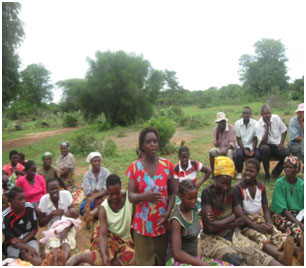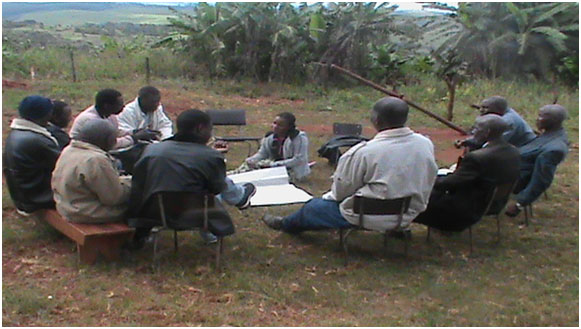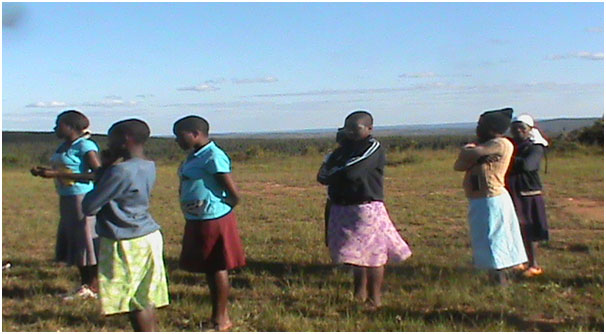WHAT
ABOUT THE WOMEN??
Gender dynamics in resource
management
In the past years, gender has been ‘mainstreamed’
into community development initiatives but this has not
transformed the lives of women living in these communities.
In fact women are marginalised especially in terms of gender
roles and responsibilities, access to and control of resources,
involvement in decision making and power relations. It does
not help that the country is largely patriarchal but still
views gender equality and social inclusion as a way of stripping
off the powers of men and placing women at the top. This
line of thought has attributed to the increase in gender
based violence promoting family disintegration, poverty,
HIV and Aids and death.
Women living in resource rich communities face social exclusion
in all spheres of life. Companies prefer to employ men at
the expense of their female counterparts. One woman, a widow
in Marange lamented ‘vari kungotora varume chete,
ko isusu? Tinodawo kushandira mhuri dzedu’ (they are
only employing men, what about us? We also want to fend
for our families) Another woman in the same area commented
that deliberate segregation of women in these companies
often lead to poverty in the community as women have been
known to be better managers of finances, whilst most men
who are gainfully employed drink away their wages leaving
the women in desperation to fend for the family by themselves.
In the tea, coffee and sugar cane industry in Chisumbanje
and Chipinge women who have been ‘lucky’ to
be employed have faced challenges both at work and at home.
It is a vicious cycle of gender based violence that has
stripped off the women their dignity and self confidence.
At work, several women have complained of their male supervisors
demanding sexual favours in exchange for lighter duties
and overtime. They give in because they need the money and
the job as in most cases they are the bread winners. They
cannot report to their superiors who are mostly men as well.
This makes women vulnerable, such that even at workers meetings
their voice is never heard. The men dominate the meetings
and the women have to abide by whatever decisions reached
by their male counterparts. The companies have not made
tangible efforts to ensure that the voices of women are
heard and their views considered.
After working in the coffee, tea and sugar cane plantations,
their husbands will be waiting to confisticate their earnings
in order to stop them from acquiring resources. An access
and control survey conducted in Chipinge ward 19 revealed
that a woman, working or not, had no right to own property.
The Ndau culture states that the husband has control over
all assets, livestock and earnings. Only 10% of the women
said they could acquire livestock such as chickens and goats
and the only assets they could earn are kitchenware. It
is a general Ndau belief that “Mombe dzemukadzi
dzinopisa dzemurume” (the woman’s cows
cause death to the man’s cows if placed in the same
kraal). So no woman can own anything and lack of ownership
means no control. In fact, an access and control tool used
revealed that 70% of the men in resource extraction communities
considered women as an asset, not a partner. When asked
to list down their assets, on top of their lists were the
wives. “mukadzi chiro changu, ndakamutenga sematengero
andinoita mombe” (My wife is and asset. I bought
her just like i bought my cow).
 |
 |
“Anhu
ari kunyengwa kuSabot uko. Maboss anenge atikana uchida
kuti basa rireruke ndide,ini ndotodawo. Amuna havadi kuseenza,ngekumwe
doro mumabhawa. Apedza oti akadzi ari kuhura otitaka!! tashatirwawo
ana tatita woye!”- Women are being asked for sexual
favors at Sabot were they go in search for work, on the
basis that they will be given lighter duties. Meanwhile,
the men don’t want to work, they go to drinking holes
the whole day. Upon discovering about the woman’s
infidelity, the man beats up the wife but still expects
her to go to work for the family.

Men taking part in Access
and control of resources discussion.
Lack of resources means the women are stripped of their
power. They are not given a chance to participate meaningfully
in community development programs, they are neither consulted
nor allowed to take part in the decision making process,
even in issues that affect them. Such was the case for displaced
families in Marange.Although families were not given opportunities
to choose between going and staying, little attention was
paid to the plight of women and children. ‘Varume
ndivo vaibvunzwa nekutaurirwa zvaiitika nekuti vanonzi ndivo
vakuru vemusha.’(Men were the only ones consulted
about the developments because the society deems them as
heads of the household). When families were relocating men
would first ensure that whatever they needed was transported
at the expense of the women’s assets. ‘Ini
baba vakatoti nditengese huku nembudzi dzangu nekuti kwataienda
kwanga kusingazokwani zvese, asi havana kana chavo chavakatengesa’
(My husband ordered me to sell all my chickens and
goats because there was not enough space for the livestock
at Arda. But he did not even sell one of his.)Women wanted
to be heard, to also voice their concerns and take part
in the negotiations, but men would have none of it and the
mining companies turned a blind eye. Upon moving, each family
was given US 1000.00 relocation fees and men purchased illicit
brews and hoards of alcohol with the money. Some men bought
livestock which they now call their own, yet the money was
intended to benefit every member of the household.

Young women participate in a Power walk -a tool to reveal
the power dynamics in a community
The effect of gender based violence in these communities
does not only affect the women, who are often considered
as the only victims, they extend to the community as a whole.
It destroys family structures and relationships, and this
relationship breakdown often seeps into the community, killing
the spirit of ubuntu, which often encourages people to work
in unity for the development of their communities. In some
instances, social exclusion of women and children may cause
trauma and emotional damage to children, who often repeat
the cycle when they become adults.
Gender based violence also aggravates the health situation
in these communities. A woman whose husband works at a mining
company in Marange explained that the company only employs
men, and no women are allowed in the hostels. The men only
get to come home after two weeks and in the meantime they
satisfy their desires with commercial sex workers at Hot
Springs- a nearby business centre.She called on mining companies
to revise this policy and allow the wives of employees to
visit frequently. ‘vanoziva here kuti zvinokonzera
mhirizhonga? Mari iri kuperera pahot apo! Vapedza
vouuya nesiki!’ (Do they know how much this has
exacerbated domestic violence? All the money is spent at
Hot Springs and then they come home with sexually transmitted
diseases!). Lack of resource ownership and control renders
women vulnerable. Women do not have the power to ask their
husbands to use protection or go for VCT in fear of being
beaten or sent back to their parents. Companies, by omitting
to pay attention and address gender imbalances in these
communities have contributed to gender based conflicts and
human rights abuses of women and children by their male
counter parts.
Resource
extraction has been known to be ‘a man’s world’
but what about women?
In order to address the challenges of gender based violence,
there is need for rights education campaigns in communities,
this will enable women to know their rights and demand them.
Companies can facilitate programs to strengthen the capacity
of communities to wear gender lenses and uphold the rights
of women and children. Companies must be aware of the need
to achieve gender balance and include women in development
initiatives, consult them and ensure they participate in
decision making processes. Community leaders and leaders
of the mining companies need to be sensitised on how to
embrace women as equals in the community. There is also
need to engage duty bearers who also play an indirect role
in women’s access to services (especially sexual reproductive
health).